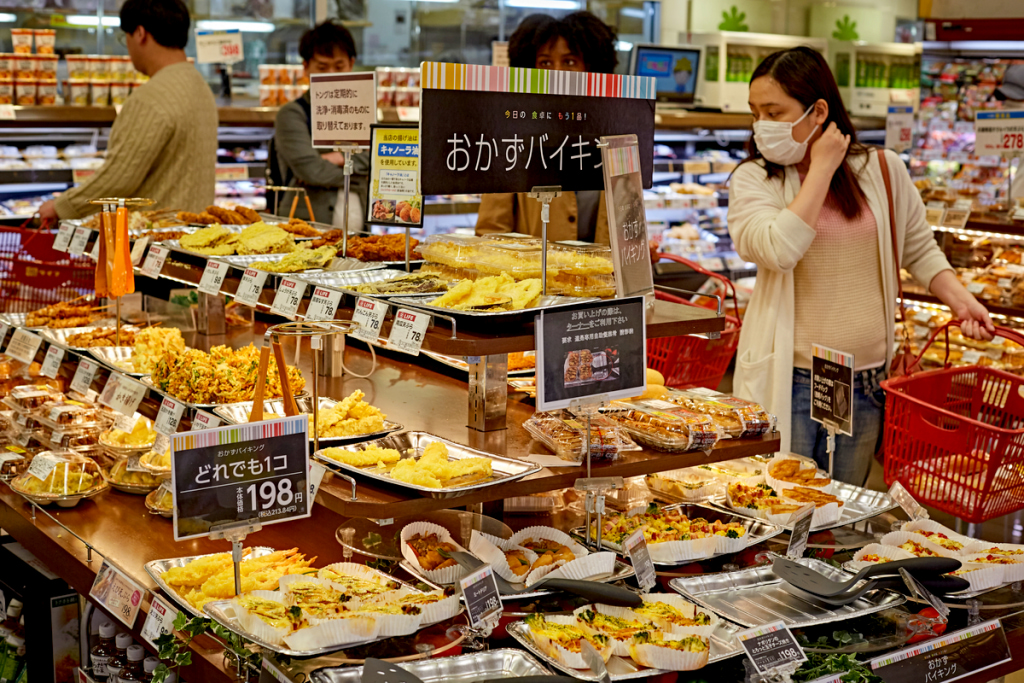As a full-time working mother of a son who just turned one, it breaks my heart every time I have to tell him to wait — as if he could understand me — while I microwave his food. I would typically boil the rice on weekends, freeze it in portions (90 grams each), have a ready stock of vegetables that can be quickly cooked and a few quick but healthy proteins — natto, tofu or boiled chicken — cut and stored in the fridge, each in portions of 20 grams, because that’s what the book says. On weekends, when we aren’t working around the clock, my husband and I take extra time to plan and cook his dinner — he even had his first okonomiyaki the other day.
But weekdays are hard. In between trying to finish all work tasks for the day and run to catch the train to be at the nursery on time (they charge ¥100 for every ten minutes after 18:30, plus the book says he has to eat before 7 pm), sometimes parents’ wish to provide a complete handmade dinner for their little ones is not achievable — despite our best intentions.
That is why when I heard about the recently trending #potatosalad (#ポテトサラダ) hashtag on Twitter, I took it more personally than I thought I would — and judging from the many comments to the original Twitter post, I wasn’t alone.
What happened
The story broke on Twitter on July 8 when user Mitsubachi described a situation she witnessed while shopping at a supermarket with her daughter. According to her tweet, she heard the words “If you’re a mother, why don’t you cook (something as easy as) a potato salad yourself,” and immediately turned around to see what was happening. She saw an older man reprimanding a woman with a small child, who was standing at the deli corner holding a pack of ready-made potato salad. The man apparently quickly left the scene, but the mother stood there with her head down, still holding the salad. Mitsubachi, who immediately sympathized with the woman, rushed to the deli corner grabbing two packs of the same ready-made salad hoping to send her message across: it’s okay to buy it!
「母親ならポテトサラダくらい作ったらどうだ」の声に驚いて振り向くと、惣菜コーナーで高齢の男性と、幼児連れの女性。男性はサッサと立ち去ったけど、女性は惣菜パックを手にして俯いたまま。
私は咄嗟に娘を連れて、女性の目の前でポテトサラダ買った。2パックも買った。大丈夫ですよと念じながら。— みつばち (@mitsu_bachi_bee) July 7, 2020
The post was retweeted over 130,000 times over the next two days and the comments kept flooding in. The hashtag #PotatoSalad, #PoteJii (“pote” for potato and “jii” the short form of the informal “jijii” — an old man) and other variations rose to the top trends on the social media platform for several days.
Been there too
The initial post received over 50,000 comments, most of which expressed criticism against the man for meddling in other people’s business — or for implying that a potato salad is easy to make (for the record, it isn’t at all). But many said they’ve been there too.
One woman wrote that she had been told off by an elderly man for reading quietly to her 2-year-old daughter while waiting at the hospital. “Don’t mumble when reading. Parents should teach their children the language. Read out more clearly.”
ちょっと違うんですけど私も前に病院の待ち合いで当時2歳の娘と絵本を読んで順番を待ってたら高齢の男性に「ボソボソ読まずもっとはっきり読んであげなさい、親がしっかり言葉を教えてあげないと」って注意されたことがあります。なんだかとっても納得いかなかったです。
— spring (@sunspring518) July 8, 2020
Another said, she was stopped by an older woman at a supermarket (yes, women are also guilty of mansplaining), asking her why her husband was shopping along. “I would never ask my husband to go shopping — why are you making your husband do that?”
わかります。
私もスーパーで年配女性に「旦那さんが買い物してるの?うちは旦那にそんな事させた事ない」的な事を言われたので、「僕、妻の事好きなんで家事手伝ってるんすよ。奥さんへの気持ちがあれば普通ですよ?」って言うと不機嫌そうに去って行きました。— オヤマケイ (@YAMA_K666) July 9, 2020
One user also shared that she had been once criticized because her child was wearing jeans: “It’s not good to put children in jeans from when they are a baby,” she was told out of nowhere.
As a young mother, I’ve also had my fair share of experience with random “casual” comments.
In Japan, it’s a common practice to have a visitation from a child-welfare consultant one month after giving birth — it’s a standard procedure by local governments to make sure that the child is properly cared for and there are no signs of abuse. When it was time for our visit, I was still recovering from the birth (which took three days altogether) and was sleep-deprived, so I overreacted in my head when she told me, “Okaasan, this isn’t good at all,” while hitting the floor with a toy we had just bought, to illustrate her point: the toy was too hard and dangerous. As exhausted, nervous and inexperienced I was at the time, I felt as if she’s telling me that I had failed. I held it together, but I cried as soon as she left the house.
On another occasion, my husband and I were grocery shopping before dinner when our son started crying hysterically. We rushed to the cashier to pay and leave as soon as possible when we were approached by an elderly woman to tell us that she believed he was hot. “You’re wearing short sleeves but have dressed him in long sleeves,” she said after staring at us for a while. He wasn’t hot, he was hungry.
It also gets me every time when the teachers at the nursery turn to me to point out when something is missing from my son’s preparation bag — even though my husband is always there with me. It gets him too, thinking that as a father, he’s not addressed by them when discussing matters related to our child. To the teachers, it’s maybe just a shortcut — but on a day when we’ve had a bit too much of everything, it may mean more to us.
To the elderly man at the supermarket (and everyone who’s ever given an “advice” to a new parent)
Let’s assume that you had no ill intentions. That you probably only meant to say that ready-foods have lots of chemicals that children should avoid. That’s correct. But your words show lack of empathy and a basic understanding of so many themes: 21st-century parenting, cooking, gender-equality, generation changes and child-rearing community support. Assuming that “a mother” should always be the one caring, feeding and going the extra mile for their children in a way that you believe is good based on your life experience, is wrong in the first place. As is assuming that she was buying the salad for her child. Maybe it was her who wanted some ready potato salad. And why not?
But even if she was buying the salad for her child — let her be. The moment you observed is just one short instance of someone’s life, a piece of the whole puzzle you have no knowledge of. Depending on a person’s mental condition, someone else’s words can cut very deep.
Trying to be the perfect parent at all times has much more damage to the child than a bite of ready-made potato salad. Research shows that parents who take occasional breaks from “textbook parenting” are doing far better than those who always meet everyone’s expectations as “perfect” parents. A stressed, sad, crying mother is much more damaging to the child than a ready-made potato salad. So don’t create such mothers when there’s no need to.
If you ever see another mother standing at the deli counter again, instead of telling her off for buying ready food, ask her about her day. Ask her about her child. Ask her to tell you more about how she’s handling everything she does in her life. Instead of using your age to patronize, compliment her on how well she’s doing. She’ll go home with a smile on her face instead of wiping her tears as she leaves the supermarket.









